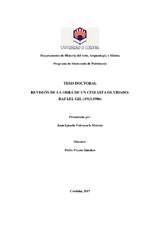Mostrar el registro sencillo del ítem
Revisión de la obra de un cineasta olvidado: Rafael Gil (1913–1986)
| dc.contributor.advisor | Poyato Sánchez, Pedro | |
| dc.contributor.author | Valenzuela Moreno, Juan Ignacio | es_ES |
| dc.date.accessioned | 2017-06-07T12:17:38Z | |
| dc.date.available | 2017-06-07T12:17:38Z | |
| dc.date.issued | 2017 | |
| dc.identifier.uri | http://hdl.handle.net/10396/14845 | |
| dc.description.abstract | Rafael Gil fue uno de nuestros cineastas más ilustres durante la dictadura franquista. De temprana vocación cinéfila, su labor como crítico cinematográfico, fundador de uno de los cine-clubs más renombrados durante la Segunda República y documentalista en la Guerra Civil Española, le otorgan los mimbres formativos necesarios para realizar su primer largometraje en 1942, El hombre que se quiso matar, como integrante de la nómina de profesionales de la productora valenciana CIFESA. A partir de aquí inicia una prometedora carrera de más de cuarenta años filmando un cine de base eminentemente literaria y popular, pero que fue transcurriendo por distintas etapas. Si durante los cuarenta Gil filma un cine de qualité y de raíces literarias, los años cincuenta están marcados por su asociación con el guionista y productor Vicente Escrivá, con quien realiza un conjunto de películas donde alcanza su madurez como cineasta. Su entrada en la producción a partir de 1957 con la creación de la empresa Coral Producciones Cinematográficas le lleva a filmar un cine de raigambre popular, atento a los gustos del público que, junto a su posterior relación con la major Paramount, que distribuye la mayoría de sus filmes de este período, le supone cierto descrédito entre las nuevas generaciones de críticos, atentos a las emergentes escuelas cinematográficas. Solo su vuelta a la literatura clásica a principios de los setenta supondrá cierta esperanza en la recuperación crítica del cineasta. Su decidida postura católica y conservadora y su adscripción a los postulados franquistas, que se mantuvieron firmes aun con el advenimiento de la democracia, como demuestran sus adaptaciones de las novelas de Fernando Vizcaíno Casas, le han ido relegando en su consideración crítica por las actuales generaciones. Vista la casi absoluta falta de publicaciones que estudien en profundidad la obra de Rafael Gil, esta investigación se ha dirigido a realizar su estudio analítico a partir de la documentación de su archivo privado y de las distintas fuentes orales y escritas, muchas de ellas inéditas, a que hemos tenido acceso, con el objeto de valorar la contribución del cineasta a la consolidación de un cine español que, durante la posguerra, tuvo que superar serios obstáculos para su pervivencia. El examen de su filmografía, de sus escritos y del contexto sociopolítico a la luz de la documentación de su archivo, otorga nuevas claves y renovado interés a su cine. | es_ES |
| dc.description.abstract | Rafael Gil was one of our more distinguished filmmakers during the Francoist dictatorship. He has been keen on films since he was a teenager, his work as cinematographic critic, founder of one of the most important cinema clubs during the Second Republic and documentary maker in Spanish Civil War, given him necessary training to film in 1942 his first movie, El hombre que se quiso matar, as member of the payroll of the Valencian company CIFESA. From here he starts a promising career of more than forty years filming a cinema eminently literary and popular, but that was going through different stages. If during the forties Gil films a qualité and literary roots’ cinema, the fifties are marked by his association with the screenwriter and producer Vicente Escrivá, with whom he makes a film set where he reaches maturity as a filmmaker. His entrance into the production in 1957 with the creation of the company Coral Producciones Cinematograficas takes to him to film a populary roots’ cinema that, along with his later relationship with major Paramount, that distributes the majority of this period’s films, implies a certain discredit among the new generations of critics, attentive to the emerging cinematographic schools. Only his return to the classic literatura in the early seventies will suppose some hope in the critical recovery of the filmmaker. His resolute Catholic and conservative position and his adherence to Franco’s postulates, which remained firm even with the democracy’s arrival, as shown by his adaptations of Fernando Vizcaíno Casas’ novels, have been relegated to critical consideration by the present generations. Given the almost complete lack of publications that study in depth Rafael Gil’s work. This research has been directed to carry out its analytical study from the documentation of its private archive and the different oral and written sources, many of them unpublished, to which we have had access, in order to appreciate the contribution of the filmmaker to the consolidation of a Spanish cinema that, during the postwar period, had to overcome serious obstacles for its survival. The exam of his filmography, his writings and the sociopolitical context, in light of his archive’s documentation, gives new keys and renewed interest to his cinema. | es_ES |
| dc.format.mimetype | application/pdf | es_ES |
| dc.language.iso | spa | es_ES |
| dc.publisher | Universidad de Córdoba, UCOPress | es_ES |
| dc.rights | https://creativecommons.org/licenses/by-nc-nd/4.0/ | es_ES |
| dc.subject | Gil, Rafael 1913-1986 | es_ES |
| dc.subject | Cineastas | es_ES |
| dc.subject | Cine | es_ES |
| dc.subject | Obra cinematográfica | es_ES |
| dc.subject | Filmografía | es_ES |
| dc.subject | Siglo XX | es_ES |
| dc.title | Revisión de la obra de un cineasta olvidado: Rafael Gil (1913–1986) | es_ES |
| dc.type | info:eu-repo/semantics/doctoralThesis | es_ES |
| dc.rights.accessRights | info:eu-repo/semantics/openAccess | es_ES |

